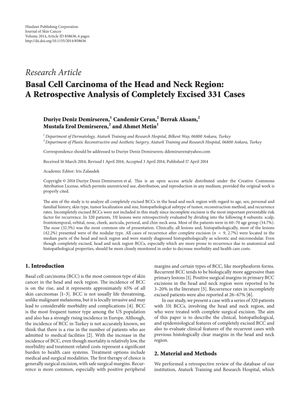Basal Cell Carcinoma of the Head and Neck Region: A Retrospective Analysis of Completely Excised 331 Cases
January 2014
in “
Journal of skin cancer
”

TLDR Most people with basal cell carcinoma on their head or neck were 60-70 years old, and it often came back even after being fully removed, especially in certain areas and types.
In a retrospective analysis of 331 cases of completely excised basal cell carcinoma (BCC) in the head and neck region, Demirseren et al. found that the most common age group affected was 60-70 years (34.7%), with the nose being the most frequent site (32.3%). The nodular type was the most prevalent both clinically and histopathologically (42.2%). Despite complete excision, there was a 2.7% recurrence rate, with recurrences primarily in the median parts of the head and neck and often of the sclerotic and micronodular subtypes. The study emphasized the need for close monitoring of patients with completely excised BCCs, especially those with high-risk anatomical locations and histopathological subtypes, to minimize recurrence and associated healthcare costs. The low recurrence rate observed was attributed to the use of appropriate surgical margins and the absence of positive surgical margins post-surgery, highlighting the importance of preoperative evaluation and follow-up.


